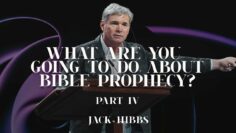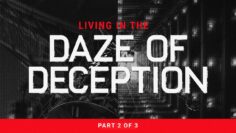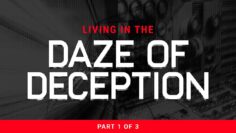
Is the Atonement Divine Abuse? Interview with William Lane Craig
Is the atonement of Jesus moral? Is it biblical? In this interview, William Lane Craig and I discuss these questions and the heart of his new book: Atonement and the Death of Christ.
READ: Atonement and the Death of Christ (https://amzn.to/2BgAZgu)
SUBSCRIBE TO THE CHANNEL (https://bit.ly/3fZ9mIw)
*Get a MASTERS IN APOLOGETICS or SCIENCE AND RELIGION at BIOLA (https://bit.ly/3LdNqKf)
*USE Discount Code [SMDCERTDISC] for $100 off the BIOLA APOLOGETICS CERTIFICATE program (https://bit.ly/3AzfPFM)
*See our fully online UNDERGRAD DEGREE in Bible, Theology, and Apologetics: (https://bit.ly/448STKK)
FOLLOW ME ON SOCIAL MEDIA:
Twitter: https://twitter.com/Sean_McDowell
TikTok: @sean_mcdowell
Instagram: https://www.instagram.com/seanmcdowell/
source











To me the idea that it's wrong for Jesus to be the atonement for our sins is like the gifted telling the gifter it's wrong to give a gift. Its absurd and frankly a ridiculous
صداع من كتر العظمة
What's Stott's objection to Christ being 'punished'?
Derek Prince's teaching series "The Fullness of the Cross" and "Atonement", both are multiple volume teaching series really do a great job looking at all of these facets. Seems to be very similar to what Dr. Craig is observing.
I have been a lawyer for more than 42 years. Dr. Craig's point about vicarious liability in civil matters is fine. Employers are often held civilly liable for the conduct of their employees under the theory of respondeat superior. If the employee is acting for the employee and if the employer has the right to control the actions of the employee, it is considered that a master-servant relationship exists and the employer can be held liable.
Dr. Craig's claims about vicarious criminal liability are weak. It is not that there are no examples of the imposition of criminal liability, but they would be hard to find nowadays. In the case of State v. Guminga, 395 NW2d 344 (1986) the Minnesota Supreme Court reviewed the propriety of criminal charges against a tavern owner for his employee bartender serving alcohol to a minor. The court ruled that imposing criminal liability on the employer violated due process under the Minnesota constitution and the Fourteenth Amendment to the US Constitution. While criminal convictions had been upheld in the past under the statute in question, the court's ruling was that only civil liability is proper under those circumstances.
Typically, one cannot be held criminally liable for another's conduct, unless one is an accomplice or engaged in a conspiracy to commit an offense and the co-conspirator's conduct and the result of it are reasonably foreseeable. Sometimes parents are held criminally liable for their child's conduct. An example may be a parent negligently allowing a child access to a dangerous weapon. However, in that circumstance, it is the parent's act of allowing access to the parent's weapon is the basis for the charge. Another example is a parent being charged for the child's truancy from school. However, in that circumstance the parent has a duty to make sure the child goes to school. It is the parent's failure to carry out that duty which is the basis for the charge. If you applied that kind of vicarious criminal liability to the atonement situation, God himself would be the one on trial for his own conduct of creating this situation and setting up it up, and in allowing the conduct. It wasn't only foreseeable, he knew it would happen.
Another important distinction is that in old cases of vicarious criminal liability, the conduct of the actor wasn't forgiven just because his employer or superior was also charged. In the tavern owner's case, if the court had not ruled the vicarious liability was improper, a criminal charge against the owner would not have substituted for the criminal liability of the employee. It would have been in addition to the employee's charge. In other words, they both would have been guilty.
In the case of God, he knew that man would sin. He placed or allowed the placement in the garden of a creature that he knew would cause or lead to Eve and Adam sinning. Vicarious criminal liability would mean that God himself is guilty of the crime of sin in addition to the humans' crime.
The assertion by Dr. Craig and Christian apologists is that it is fair and reasonable for Jesus to assume vicarious criminal liability for humans. Modern law would see that as violating due process. I assume the response would be that God decreed it as being fair and since he is the one assuming liability, it is fair for him to do so. What goes unanswered in such a scenario is why God decreed that someone has to die for conduct (or existence) which he decrees to be sin. If the father of the prodigal son can forgive without requiring someone to die, why couldn't God? The rule that someone has to die was a rule he made. He did not have to make it. There is no principle of justice that requires it. I suggest he made an unfair rule.
Hello I am new to your channel. Blessings. I just want to share that my youngest son(who is 24yrs old) Surrender to Jesus and now is a Child of the Most High God. I am so. so happy as a Mom who never stopped hoping and praying for my kids Salvation. I have 2 Sons who are Saved. Now I just need my daughter and her husband to surrender To Jesus!!
Never give up on hope for praying for your unsaved loved ones. Whenever in the past I would talk about Jesus to my newly saved son he would express so much hatred and anger for me and Jesus!! Now when we talk about Jesus he is happy and very appreciate and grateful. He even stopped smoking pot too!!! Praise God. Well, Satan you Lost!!!!
Blessings to all!!
Dr. Craig seems to think that Jesus dying on the cross "propitiates" God. That seems to go against the biblical data that God offers Jesus because of who God is—not to change something about Him. Romans 3:25, 1 John 2:2 & 4:10 all have God offering Jesus as the propitiation to the world (a complete reversal of pagan conceptions of appeasing a deity). In Hebrews 2:17 the propitiation has sins as the object— not God! Propitiation is one of the most unfortunate translations in the Bible because the words that sometimes get translated as "propitiation" focus on "expiation"—making something right (this can be seen in the BDAG lexicon and others). This focus on righteousness is demonstrated from the context of the verses referenced. What do you think, Dr. McDowell, do you agree with Dr. Craig that punishment is at the center of the cross? Are there really biblical grounds for putting punishment (or anything else) before righteousness when it comes to discussing why Jesus died?
I think God's "role" in the Divine justice system is made clearest in Job. In that, who is man to ignorantly assume being God is not complicated. To do justice for one, always ensures injustice for someone else. That's why it's said, "separate the wheat from the tares"…the two so enterwound together can only be pulled apart at harvest. Now, thanks to Christ, we don't have to depend on our own ability, or watch someone we love try to save them self either. My life example is watching a good Christian mother's heart break each time her son gets the justice he deserves for his life choices. He deserves his punishment. She does not. But both reap pain for the same justice. And both are offered redemption from it one day. All I know, is that although I have begged God for such an outstanding moment of proof that His Spirit resides in me, and have yet to feel anything but luke warm in my faith, I know He is here because of justice. It is complicated. It is a Law of Nature, not to steal from CS. And by no accident will Time be reconciled. Each life will be worth the price it was bought.
So, the word "atonement" itself is not really a "biblical" word…because it is not so mentioned in the Bible!?
The definition of "Atonement" as described by Dr. Craig is also discussed quite well by Jeremy Myers in his books, "The Redemption of God" and "The Atonement." Quote interesting and intriguing! Selah!
I’m confused, he says he was waiting for a philosopher to step up, what were the philosophical parts of the atonement that others like John Stott didn’t cover?
Dr Craig says that under divine command theory, it is not unjust for God to punish an innocent for the sins of the guilty because God has not commanded that this would be unjust.
I would issue a friendly word of caution to Dr Craig, because this same tactic can be used by determinists to argue that it is not evil for God to cause evil – because God has never made a law saying that God cannot do such a thing.
In fact, this exact argument has been used specifically against Dr Craig himself:
https://www.godcontention.org/christian/william-lane-craig-and-divine-determinism
It is suggested that "if it is evil to make another person do wrong, then on this view God is not only the cause of sin and evil, but becomes evil Himself, which is absurd", and we of course agree that such a conclusion is absurd, quite simply because it is not evil for God to make a human do something sinful. In rejecting the premise, as the scriptures do, we are not bound to the absurd conclusion. In elaboration, the Bible defines sin as the transgression of the law (1 John 3:4). Thus, in order for God to sin, we must first believe that there is in fact some kind of law that governs Him. Since He is the source of all laws, He would have had to order Himself not to cause anyone to sin. Then, in order for Him to be a sinner, He would have had to disobey His own order for Himself. We see no such command governing God in scripture, and since we do clearly see God causing people to sin, and since we know that God, the one in absolute authority, cannot possibly sin or err in any way or else He would be opposed to Himself and therefore no longer in authority, we must necessarily come to the conclusion that God has not in fact ordered Himself not to cause people to sin. Thus, it is not a sin for Him to do so.
Interesting stuff: thanks for this!
Introduction on the first few minutes: If you want a book written that defends Atonement philosophically in a satisfactory manner, you gotta write it yourself
As if I wasn’t impatient enough waiting for my copy to arrive, now I saw this video😀 Great interview!
Thank you, Sir.
It was really helpful.
William Lane Craig will also be interviewed on his theory of the incarnation (how Jesus can be both God and man) in about 11 days. See this link. https://www.youtube.com/watch?v=3o9b_r0ReCk